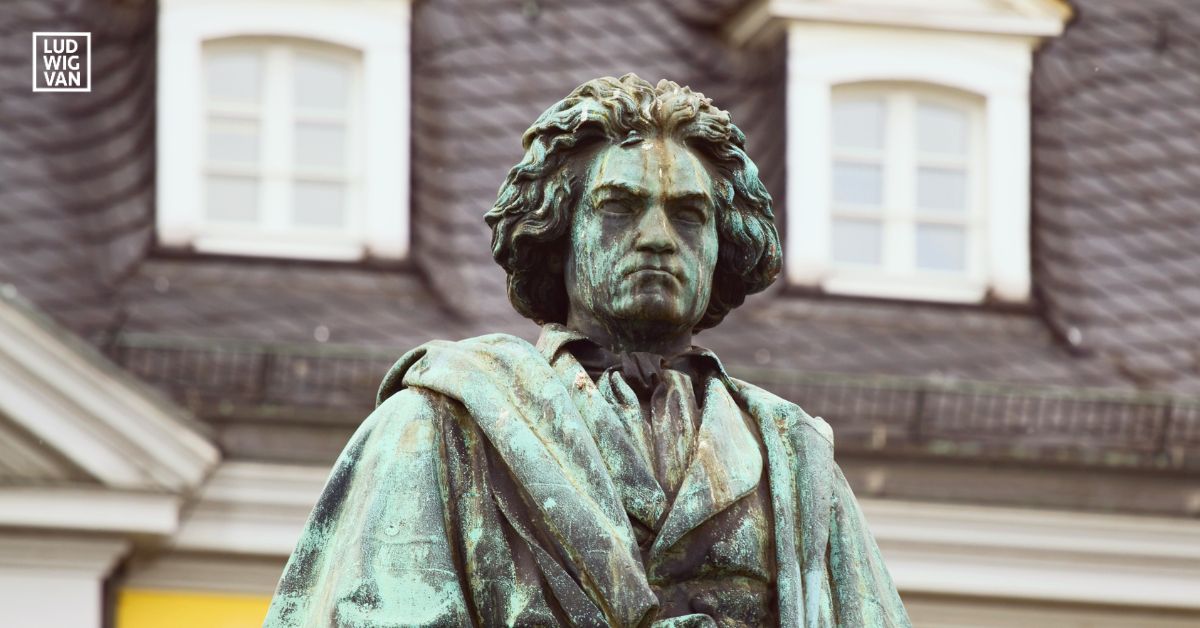
The details of Ludwig Van Beethoven’s birth may be somewhat obscure, even to the Master himself in his day. In his personal letters, he admitted to not knowing his exact age — but there’s still a surprising amount of detail that historians do know about his daily life.
Ludwig van Beethoven was probably born in Bonn, Germany on December 16, 1770. Luckily for historians, and his admirers centuries later, Beethoven grew to become well-known in his own era. Many paintings and illustrations of him still exist, and many of them show him in the activities of his daily life, particularly during his later years. Ludwig also kept voluminous notes, including sketchbooks, letters, journals, and other assorted documents.
A day in the life…
His parents were Johann and Maria Magdalena van Beethoven. Father Johann became the Kappellmeister (choirmaster) for the archbishop-elector of Cologne. While there was a period of stability after Ludwig’s grandfather died, Johann gradually spiralled into alcoholism, and the family’s fortunes took a nose dive. Beethoven left school at 11, and was the family breadwinner at 18.
It’s probable those early responsibilities instilled a sense of discipline in him. In his later years in particular, he was known for keeping a regular — and highly productive — schedule.
The beloved composer was an early riser, and punctual as a rule. Beethoven was up at dawn on most mornings. He was meticulous about his coffee, which he brewed himself from exactly 60 coffee beans each day.
After coffee, he’d get to work composing until the afternoon, with at least one break for a walk on a typical day.
Beethoven attended to business after composition. That usually meant correspondence with clients and music publishers. Existing documents, for example, detail a payment of 212 florins to Artaria publishing house for engraving his Trios op. 1.
At about noon, he’d eat lunch, and many times, that included guests. The noon meal would have been the largest, served with wine.
Later in the afternoon, Beethoven would go on long walks, carrying paper or sketchbooks and pencils in his pockets. He’d jot down the musical ideas inspired by those hikes. For many years, from May to October, he spent time near Vienna in a small village. His country walks were documented in his sketchbooks, some of which survive, and illustrations depict those walks. It was already becoming part of his mythology during his lifetime.
Along with his daily life, the sketchbooks reveal much about his working method. While he’d begin with those moments of raw inspiration, they were carefully crafted and polished into the compositions we know today. He often worked on multiple pieces simultaneously in a process that would take months, and sometimes even years. Early notes on the famous Fifth Symphony, for example, are dated 1804, four years before the finished work was published.
His scores, with multiple revisions and modifications, speak to his sense of perfectionism, and just how productive his process was.
Symphony No. 6, “Pastoral” performed by the Chamber Orchestra of Europe and the director Yannick Nézet-Séguin, recorded February 7, 2017 in the Grande Salle Pierre Boulez to the Philharmonie de Paris.
After his walks, he’d regularly head to the tavern or inn to read a newspaper and meet with friends. Beethoven had a tight network of friends, many of whom he maintained close relationships with for decades. Sometimes it was his friends, like Eduard Klosson, an official he socialized with in Vienna, who drew sketches of him enjoying a drink at the inn.
After supper, in Germany a lesser meal to the midday dinner, he’d enjoy a beer and smoking his pipe. A creature of habit, he frequented the same inns, restaurants, and cafés week after week.
Art saved his life
Along with hearing loss, Beethoven suffered from lifelong digestive issues that made his life difficult. In October 1802, staying in the village of Heiligenstadt, Beethoven wrote a letter to brothers Carl and Johann that has since been dubbed the Heiligenstadt Testament. In it, he talks about facing the finality of his hearing loss.
What humiliation when anyone besides me heard a flute in the far distance, while I heard nothing, or when others heard a shepherd singing, and I still heard nothing! Such things brought me to the verge of desperation and well-nigh caused me to put an end to my life. Art! Art alone, deterred me. Ah! how could I possibly quit the world before bringing forth all that I felt it was my vocation to produce?
[…]
I joyfully hasten to meet Death. If he comes before I have had the opportunity of developing all my artistic powers, then, notwithstanding my cruel fate, he will come too early for me, and I should wish for him at a more distant period; but even then I shall be content, for his advent will release me from a state of endless suffering. Come when he may, I shall meet him with courage. Farewell! Do not quite forget me, even in death.
Luckily, his discipline and the ability it gave him to keep working gave the world another 25 years of his work — and a towering musical maturity — to enjoy.
- Sustainability and the Music Industry - February 26, 2024
- Online Content Creators Continue Trend of Choosing Classical Music - December 18, 2023
- TikTok #Classicalmusic Challenge Returns For Round 2 - July 31, 2023


